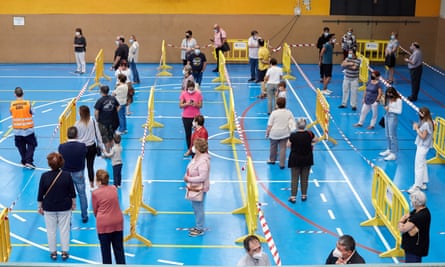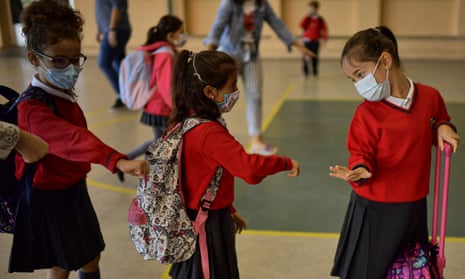Spain has become the first western European country to record more than half a million Covid-19 cases, logging a total of 525,549 infections as concerns also grow over the rise in cases in France and the UK.
The Spanish milestone comes amid a continuing surge in infections as millions of children begin returning to school after a six-month hiatus.
According to the latest figures from the health ministry, Spain has logged 49,716 new cases in the past week, and 237 deaths. Around a third of the new cases and deaths are in Madrid, the region hardest hit by the pandemic.
Spain has the fastest rise in daily confirmed cases in Europe, which began a climb in July, with France showing a similar increase beginning in August.
The UK has recorded 349,500 cases, France 347,268 and Italy 277,634.
A UK government source said there was significant concern that the UK was “six weeks behind France”, while Matt Hancock, the British health secretary, on Monday described the recent rises as concerning.
When the pandemic was at its peak on 31 March, Spain had 9,222 new cases and 849 deaths in a single day. In Madrid’s hospitals, 18% of beds are occupied by Covid patients, compared with a national average of 7%.
Fernando Simón, the head of Spain’s centre for health emergencies, has acknowledged the rise in infections, but pointed out that 50% of new cases are asymptomatic and more than half of them are in people under 40 – who are at a lower risk of death.
Ángela Hernández Puente, a surgeon and deputy general secretary of Madrid’s Amtys medical association, said the current situation was very worrying but not comparable with the overwhelming pressure the health system was under in March and widespread testing was leading to the diagnosis of many mild and asymptomatic cases.
She warned, however, that the hard-won gains of Spain’s lockdown – one of Europe’s strictest – were being squandered by irresponsible behaviour and a lack of proper preparations. “If we can’t stop the spread of the virus, we’ll start seeing what we saw in March once again,” she said.
“People need to act responsibly on an individual basis – by wearing a mask, washing their hands and maintaining social distancing. On a public health level, we need really exhaustive contact tracing, which, unfortunately, we haven’t been seeing. We brought transmission really low during the lockdown but we didn’t back it up by investing in frontline public health and it’s starting to get away from us again.”

While some have suggested that Spain’s sociable and gregarious culture may have helped spread the virus following the end of the three-month lockdown, Ildefonso Hernández-Aguado, professor at the Miguel Hernández University in Alicante and a former director general of public health for the Spanish government, said there was no simple explanation.
“I don’t think the cultural question is enough to explain it, because I don’t think we’re that different to the Italians or the Portuguese,” he said.
Hernández-Aguado said some regions had failed to invest in contact tracing but there was also a lack of firm behavioural information. “We also need to understand why young people are really good at wearing masks when they walk down the street, but then take them off when they sit down to have a beer.”
Rafael Bengoa, co-director of the Institute for Health and Strategy in Bilbao, said Covid was a “slowburn” pandemic that had laid bare years of underinvestment in public health, and warned that a series of “micro-lockdowns” would probably be required in Spain.
“If you have a weak public health infrastructure and your track-and-trace is also weak, you end up with a kind of fragmented patchwork of interventions,” he said.
“Some parts of Spain are doing worse than others and have clear community transmission so the numbers there keep going up. There comes a point when community transmission is so high that you can’t do track-and-trace and you need small lockdowns. I think the most affected parts of Spain are going to need to have micro-lockdowns to get the situation under control.”
The Spanish prime minister, Pedro Sánchez, on Monday sought to reassure worried parents as children continued a staggered return to school more than two months after the government lifted lockdown. All pupils in all regions will be back by the end of the month and children over six will have to wear face masks.
“There’s no such thing as zero risk,” he told Spanish television. “But our children and teachers will have the guarantee of being in safe centres. Parents can be calm.”
The regional president of Madrid was last week blunter, warning that almost all the children about to return to school in the region were likely to pick up the virus over the coming months because the stringent measures in place in the classroom were not being observed at family gatherings or in parks. Madrid on Monday banned gatherings of more than 10 people and announced the number of contact tracers in the region will almost double, rising from 560 to around 1,100.
A leading epidemiologist in France has warned that if the number of Covid-19 cases continues to rise at the current rate, the country could face a “critical situation” in several regions in December as it recorded a further 7,071 new cases on Sunday evening, following an increase of around 8,500 on Saturday and almost 9,000 new cases on Friday.
“Today, we have a rise in the number of new cases a week of 30% and a 15% increase in the number of hospital admissions a week,” Prof Antoine Fontanet told the LCI news channel. “If this rhythm continues, we will reach a critical situation in several regions of France in December. It is better to act now; the earlier we act the less strict the measures will be and the fewer there will be.”
On Sunday almost 3,000 people in the UK tested positive for Covid-19, a 50% increase in a single day and the highest daily total since May.
“This virus can spread rapidly, exploiting any opportunity we give it – and we are giving it many by giving up on things that have worked so far,” said Martin McKee, professor of European public health at the London School of Hygiene and Tropical Medicine.
“Worse, we have wasted months failing to build a fully functioning testing and tracing system. Any predictions must be made with caution but the risk of following Spain remains high until we develop a joined-up strategy with ambition, what we have called a zero Covid strategy that has been adopted elsewhere.”
Paul Hunter, professor in medicine at the University of East Anglia, said there was not an “apples-to-apples comparison” in terms of the case counts between European countries but tourism and transmission in younger people appear to implicated in the rises.
“Reports of cases in Mediterranean countries have highlighted the spread in younger people. And I think I think that is almost certainly the case. And you could pretty much know that by the fact the death toll is so much lower than it was in March, April, which is a pretty good indicator that the average age of cases is so much lower.”
He said the predominant spread in cases in the UK was also due to transmission in younger people, such as teenagers and young adults, but that could mean a peak in cases in December and January.
“Unfortunately, it’s never going to stay in that group because teenagers and young adults are at risk of passing it on to elder relatives, relatives who might have other vulnerabilities that would make them more likely to succumb. So I think we’re likely to see an increase in deaths, which will probably not become really noticeable by the end of this month.”
